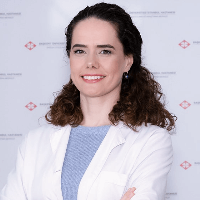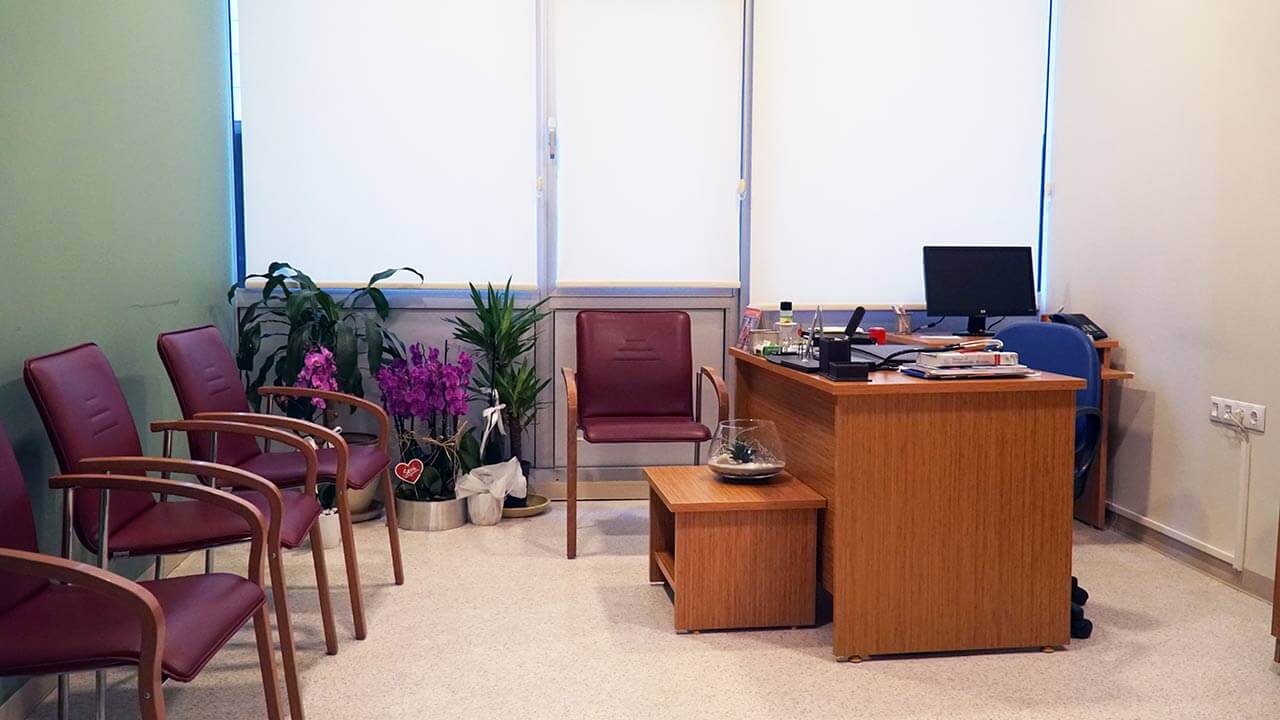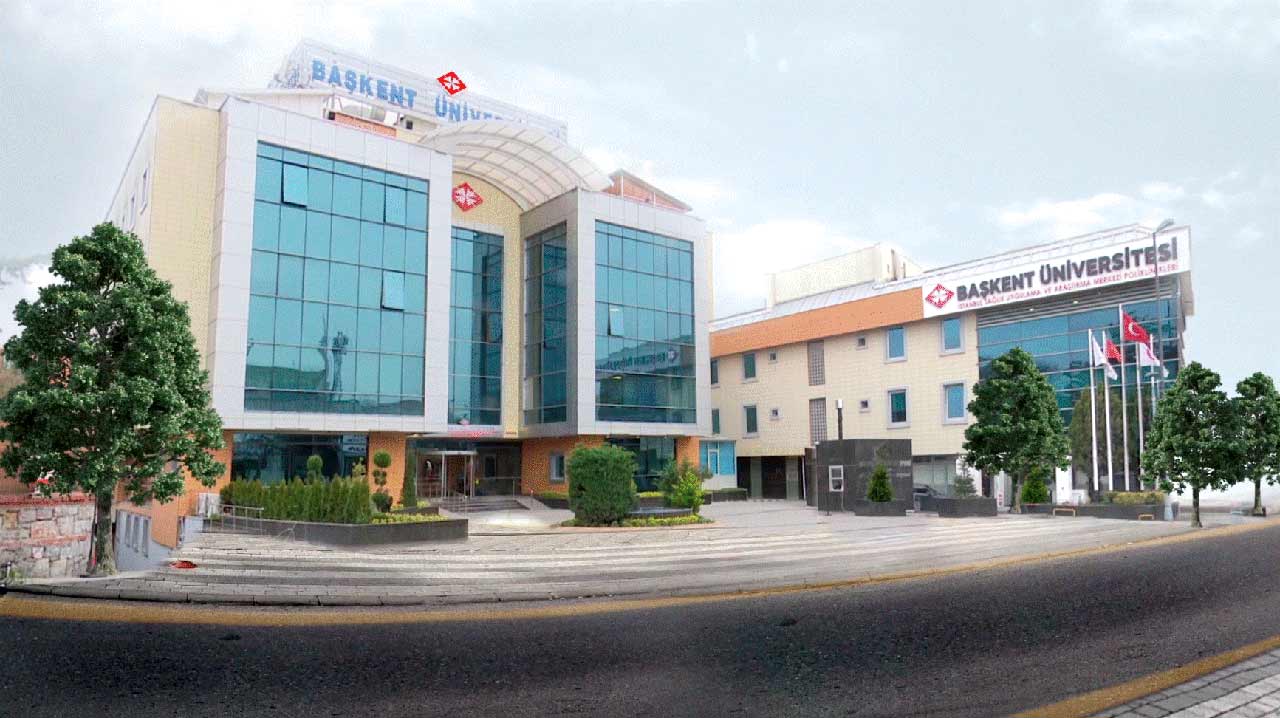
The program includes:
- Initial presentation in the clinic
- clinical history taking
- review of medical records
- physical examination
- neurological examination
- CT/MRI scan of head
(if indicated clinically, additional cost is 650/1200€) - nursing services
- consultation of related specialists
- treatment by chief physician and all leading experts
- explanation of individual treatment plan
Required documents
- Medical records
- MRI/CT scan (if available)
Service
You may also book:
 BookingHealth Price from:
BookingHealth Price from:
About the department
The Department of Adult and Pediatric Neurosurgery at the Baskent University Hospital Istanbul offers the full range of surgical treatment of diseases of the nervous system at the highest level of modern medicine. The department employs highly professional neurosurgeons who use the widest arsenal of innovative technologies for the restoration of health of patients with tumors of the brain, spinal cord and spine, cerebrovascular diseases, intracerebral hemorrhages, traumatic brain injuries and other pathologies, which pose a threat to the patient's life. The department also provides treatment of neurosurgical diseases in children. The Chief Physician of the department is Dr. med. Semra Isik.
The doctors working in the department demonstrate excellent treatment results, which are facilitated by high-precision preoperative diagnostics, careful planning of each stage of surgery using modern computer systems, as well as professional performance of the operation and proper follow-up care. Whenever possible, the department's surgeons always give preference to minimally invasive techniques that virtually eliminate injury to healthy tissues of the brain and spine, as well as significantly reduce postoperative recovery.
The surgical interventions to treat diseases of the central and peripheral nervous system are performed in state-of-the-art operating rooms, which have all the necessary instruments and computer-assisted devices – operating microscopes, navigation systems, intraoperative monitoring devices, endoscopic surgical equipment, latest generation computed tomography scanners, etc. All these technical resources allow the department's neurosurgeons to mitigate the risks of developing serious complications during the operation. For example, operating microscopes significantly magnify the image of the operating field, which helps the surgeon avoid manipulations that can lead to irreversible changes in the functioning of the brain or spinal cord. The cutting-edge intraoperative navigation and imaging systems allow the surgeon to navigate within the operating field and perform each stage of the operation with pinpoint accuracy.
The department most often admits patients with benign and malignant brain tumors. Depending on the specific clinical situation, the tumor resection can be performed using microsurgical and minimally invasive interventions. If the operation is contraindicated, the patient is offered an innovative alternative treatment – radiosurgery. This type of treatment is a single targeted irradiation of the pathological focus with a high dose of ionizing radiation. Radiosurgical treatment does not require any surgical incisions in the operated site. Nevertheless, the therapy allows destroying a malignancy in hard-to-reach regions of the brain with no injury to the functionally important anatomical structures of the brain. The technique guarantees effective destruction of malignant cells and high chances for a complete recovery of the patient.
The department's priority focuses also include surgical procedures on the spine and spinal cord. The department's specialists are distinguished by unique qualifications in the treatment of benign and malignant neoplasms of the spine and spinal cord, intervertebral disc herniation of the lumbar and cervical spine, and spinal fractures. In addition, the area of competence of the department's doctors also includes pain therapy for pain syndromes in the back and coccyx. In most cases, the doctors resort to epidural steroid injections to relieve this type of pain.
The department provides treatment to young patients with neurosurgical disorders of varying severity, including brain tumors, arteriovenous malformations, hydrocephalus, tethered cord syndrome, spinal dysraphism, etc. The operations in children are performed by surgeons who have undergone specialized training in the field of pediatric neurosurgery. Prior to treatment, young patients undergo CT and/or MRI scanning in order to accurately identify the cause of the pathology and its localization. If clinically indicated, the doctors use sparing minimally invasive techniques. The operating microscopes, neuronavigation and intraoperative imaging control systems are also widely used during operations.
The department's range of medical services includes:
- Surgical treatment of brain diseases
- Benign and malignant brain tumors (microsurgical, minimally invasive and radiosurgical interventions)
- Cerebrovascular disease (for example, cerebral aneurysm)
- Intracerebral hemorrhage
- Arteriovenous malformations of the brain
- Traumatic brain injuries
- Surgical treatment of diseases of the spinal cord and spine
- Benign and malignant tumors of the spinal cord and spine
- Intervertebral disc herniation of the lumbar and cervical spine
- Spinal injuries and fractures
- Spondylolisthesis (slipped vertebrae)
- Pain in the back and coccyx
- Surgical treatment of diseases of the peripheral nervous system
- Impingement syndromes
- Benign and malignant tumors of the peripheral nervous system
- Traumatic injury to peripheral nerves
- Surgical treatment of neurosurgical diseases in children
- Benign and malignant tumors of the brain and spinal cord
- Arteriovenous malformations of the brain
- Hydrocephalus
- Tethered cord syndrome
- Spinal dysraphism
- Surgical treatment of other disorders of the central and peripheral nervous system
Curriculum vitae
Higher Education and Postgraduate Training
- 2005 Doctoral Degree, Faculty of Medicine, Uludag University.
- 2013 Internship, Department of Neurosurgery, Uludag University.
Professional Career
- 2013 - 2015 Work in the Hakkari State Hospital.
- 2015 - 2016 Research Fellow, Prof. Dr. med. James Rutka Laboratory, Hospital for Sick Children, Peter Gilgan Centre for Research and Learning, Labatt Brain Tumour Research Centre, University of Toronto, Toronto, Canada.
- 2016 - 2017 Work at the Medical Park Goztepe Hospital.
- 2017 Work in the NP ISTANBUL Brain Hospital.
- Since 2017 Chief Physician of the Department of Adult and Pediatric Neurosurgery at the Baskent University Hospital Istanbul.
Awards and Honors
- 2013 Best Oral Presentation Award, Scientific Congress of the Turkish Neurosurgical Society. Subject of the report: "The effect of cross-linked high molecular weight hyaluronic acid on epidural fibrosis: an experimental research".
- 2015 Best Young Neurosurgeon Incentive Award, Turkish Neurosurgical Society.
Memberships in Professional Societies
- Turkish Medical Association.
- Istanbul Medical Association.
- Turkish Neurosurgical Society.
- European Association for Cancer Research (EACR).
Photo of the doctor: (c) Istanbul Başkent Hospital
About hospital
The Baskent University Hospital Istanbul is a progressive medical complex, whose primary purpose is to provide medical care of the highest quality in a pleasant and comfortable environment. The hospital is part of the prestigious Turkish Baskent University Healthcare Group, whose outstanding achievements are known not only nationally, but also in the international medical arena. The medical group was founded by Prof. Dr. med. Mehmet Haberal, who was the first specialist in Turkey who performed kidney transplantation from a living donor. The hospital in Istanbul opened its doors to the first patient on February 23, 2007, and since then has gained a solid reputation among the top medical facilities in Turkey.
The medical complex has a high-tech base both for accurate diagnostics and effective treatment according to international standards. Special attention should be given to the medical staff of the hospital. The hospital employs professors and doctors with colossal clinical experience. They successfully cope even with especially complex clinical cases. Many specialists underwent training in leading medical centers in America and Europe.
The hospital represents almost all branches of modern medicine. The areas of special competence of the hospital are transplant surgery, cardiac surgery, general surgery, urology, otolaryngology and other medical disciplines. The medical complex has the prestigious ISO 9001:2015 certificate, which is awarded only to the hospitals with impeccable quality of medical service.
The hospital has 125 beds for patient hospitalization, including additional beds in Intensive Care Units, Dialysis and Palliative Care Sections. Every year, the hospital admits more than 7,000 inpatients and more than 180,000 outpatients. In addition, the doctors annually perform more than 4,000 surgical interventions of varying degrees of severity in state-of-the-art operating rooms of the hospital. The medical facility admits many patients from foreign countries, which confirms its high credibility at the international level.
Photo: (c) Istanbul Başkent Hospital, (с) depositphotos
Accommodation in hospital
Patients rooms
The patients of the Baskent University Hospital Istanbul live in comfortable rooms with modern design. All patient rooms are made in light colors and have an ensuite bathroom with shower and toilet. The standard patient room furnishings include an automatically adjustable bed, a bedside table, a wardrobe for clothes, a table and chairs for receiving visitors, as well as a telephone and a TV.
Meals and Menus
The patient and the accompanying person are offered a daily choice of three menus. If you are on a specific diet for any reason, you will be offered an individual menu. Please inform the medical staff about your dietary preferences prior to the treatment.
Further details
Standard rooms include:
Accompanying person
During the inpatient program, an accompanying person may stay with the patient in the room or at a hotel. Our managers will help you choose the most suitable option.
Hotel
During the outpatient program, the patient may stay at the hotel. Our managers will help you choose the most suitable option.






